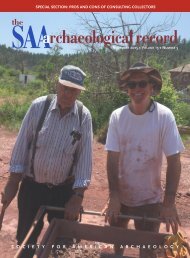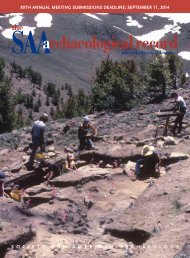SAA
Nov2016_web
Nov2016_web
Create successful ePaper yourself
Turn your PDF publications into a flip-book with our unique Google optimized e-Paper software.
VIDEO GAMES AND ARCHAEOLOGY<br />
Figure 2. In Destiny, the collection of “engrams,” artifacts that are identified by a “Crypto-archaeologist,” are the main means of economic progression.<br />
Through the sale of the looted objects, the player gains money and items to aid in game progression. It’s virtually impossible to opt-out of the system.<br />
researching archaeologist is more complex. Does an individual<br />
participating in an in-game looting scenario condone the<br />
practice overall? Is it a tacit encouragement to loot outside of<br />
the in-game scenario? Is it, even, perhaps a violation of the<br />
ethical codes of professional archaeological societies?<br />
Another area of concern relates to interactions with representations<br />
of native populations. Is it the ethical responsibility<br />
of the researcher to note any occurrences of colonialism,<br />
racism, or ethnocentrism in the narrative or game environment?<br />
If such issues of design or narrative are present, do<br />
archaeologists ignore them in favor of obtaining data<br />
through play, or do they choose to refrain from engaging<br />
with created worlds that promote the misrepresentation of<br />
indigenous peoples (Figure 3)? As with the question of<br />
engaging in looting behaviors, there are legal, social, and<br />
professional ramifications for archaeologists who perpetuate<br />
negative interactions with indigenous peoples in the material<br />
world, but how should those relationships be negotiated<br />
in digital space, where the indigenous group may not have<br />
any recourse to protest their representation?<br />
Single-player games can prompt, through play, questions<br />
about appropriate and inappropriate uses of violence, the<br />
presence of the objectification of women in modern and historical<br />
narratives, and the expression of political ideologies<br />
via the gamification of the political process. The field of<br />
“serious game studies” has addressed some of these issues,<br />
but as applies to players and game developers, not those who<br />
research within the game itself (Sicart 2013). If an action<br />
taken in a game would be unacceptable to undertake as an<br />
action in a traditional field environment, is it ethically permissible<br />
to undertake that action when researching in a dig -<br />
ital space? Working within a single-player environment<br />
doesn’t limit the need for ethical guidelines, it refocuses<br />
them on the acts of the researcher in relation to a static environment,<br />
an environment in which they can interact but cannot<br />
necessarily affect change. The researcher can’t change<br />
the narrative or the world of study outside of interactions<br />
considered and allowed by the world’s creator, the game<br />
developer. This limits what the researcher can do and makes<br />
it her choice as to whether or not to participate overall.<br />
Researching in a Multiplayer Environment<br />
Working within a multiplayer environment provides a more<br />
traditional ethnographic fieldwork experience. Although<br />
some of the issues related to interaction with the game world<br />
November 2016 • The <strong>SAA</strong> Archaeological Record<br />
31




